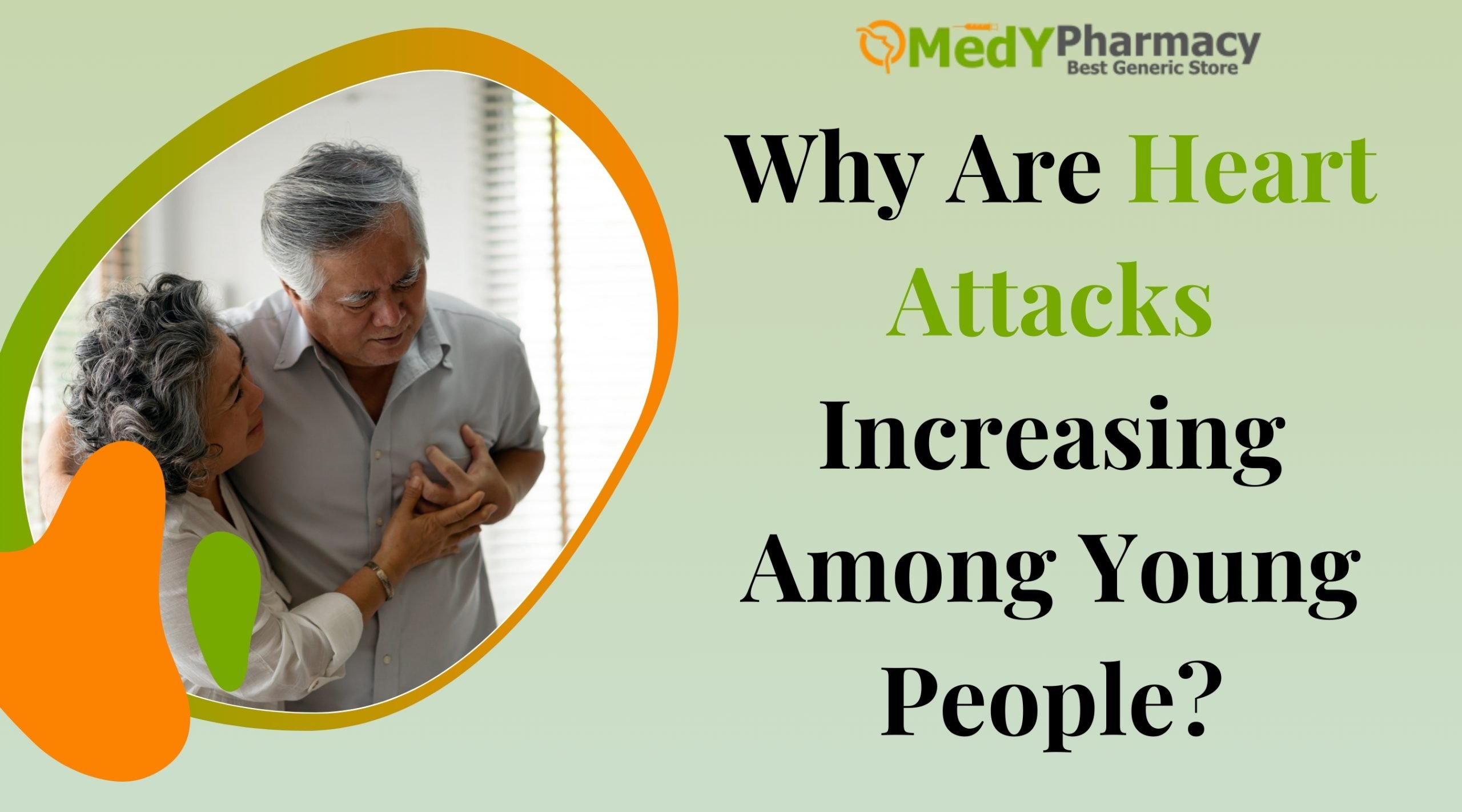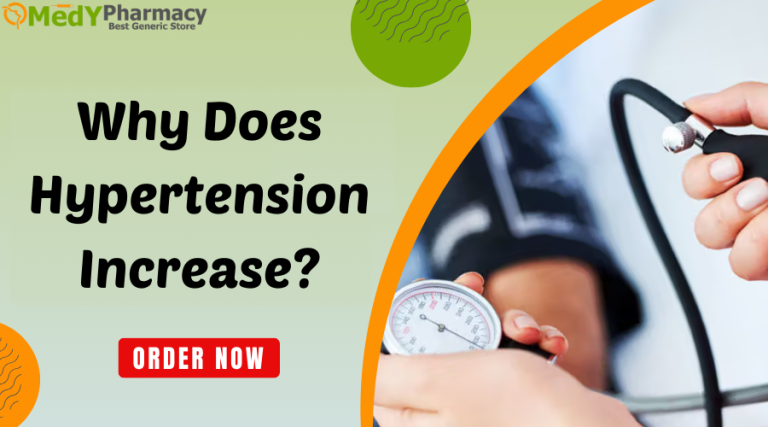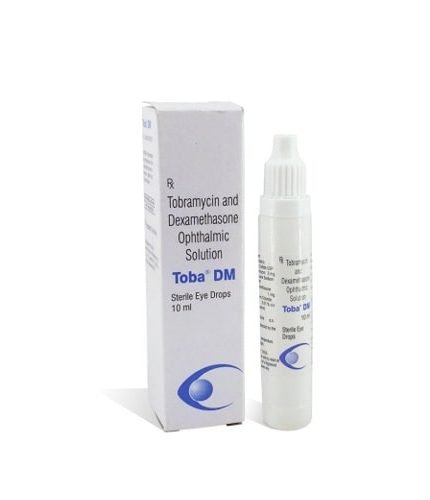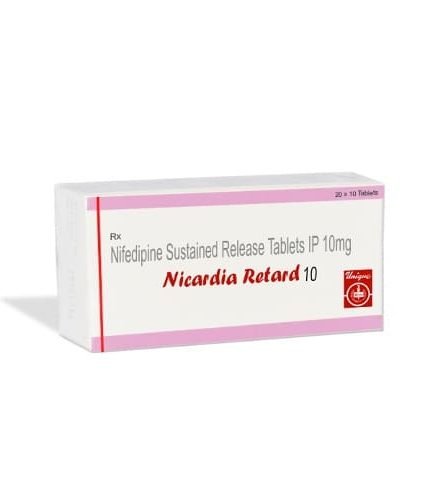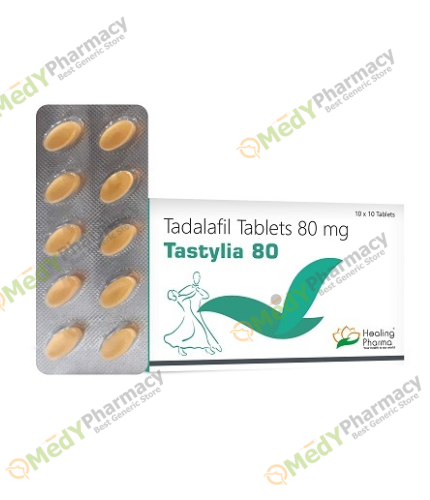Introduction:
These are undoubtedly some of the most prevalent conditions among today’s youth and younger individuals.
Heart problems including high blood pressure, chest discomfort, or even a heart attack are frequently reported by persons as young as their 20s or 30s.
Even more startling is the widespread belief that individuals in their 30s or 40s have miraculously survived a severe heart attack, many of which have resulted in death.
Since the number of heart attacks among young people is on the rise, we need to understand why this is happening and how to stop it.
Well, this is precisely what this post will be about. This essay will explain why these are becoming more frequent among young individuals. The next step will be to learn how you might avoid being a victim of such a serious medical emergency.
Undiagnosed cardiac disorders, such as hereditary heart disease, can cause unexpected death in young adults and teens. When participating in competitive sports or other strenuous activities, a young person may unexpectedly pass away from an undiagnosed cardiac problem. However, inactivity might still result in abrupt cardiac death.
Without a cardiac issue, the majority of student-athletes participate each year. Speak with your healthcare provider if you or your kid are at risk for heart attacks. Inquire about ways to reduce the danger.
When a person has their first heart attack, they are typically 72 years old for women and 65.5 years old for men. A person’s age raises the danger.
Although suffering a heart attack is rare in youth, the number of heart attacks among those under 40 has increased by 2% in the past ten years.
Also known as myocardial infarctions, happen when the heart muscle’s blood supply is cut off, generally as a result of a blockage. This results in insufficient blood and oxygen reaching the heart.
This results from irreparable damage to the heart muscle that cannot be repaired without medical intervention.
What Is a Heart Attack?
This happens when the cardiac muscle’s oxygen-supplying blood flow is drastically diminished or stopped altogether, frequently due to a blocked artery. The combination of fat, cholesterol, and other chemicals known as plaque can cause arteries to constrict or get clogged.
Losing its blood supply causes the heart muscle to suffer since the heart requires oxygen to survive. The size of the area where the blocked artery is located and the interval between the heart attack and therapy determine how much damage is done to the heart.
Also referred to as a myocardial infarction, this condition happens when a portion of the heart muscle’s blood supply is cut off. Plaque, or fatty deposits, accumulate in the coronary arteries and produce this obstruction. A ruptured plaque may form a blood clot that prevents oxygen-rich blood from reaching the heart muscle.
Insufficient blood flow may cause damage or even death to the afflicted cardiac muscle. Among other symptoms, this may cause lightheadedness, dyspnea, and chest pain or discomfort.
To reduce cardiac damage and increase survival chances, these critical medical emergencies must be treated quickly. The chance of suffering a heart attack can be raised by factors such as obesity, smoking, high blood pressure, high cholesterol, and a sedentary lifestyle.
In Younger Adults, Heart Attacks
These are less frequent but still conceivable in younger adults. Although heart attacks and heart disease are frequently linked to older folks, younger people might also be in danger due to certain risk factors and illnesses.
The key to lowering the risk of heart attacks in children is to emphasize good lifestyle choices. A balanced diet, regular exercise, stress management, quitting smoking, abstaining from excessive alcohol use, and routine checkups can help prevent many of the problems that cause heart attacks.
In the first year after a heart attack, young women are 1.6 times more likely to die, although males are more likely to experience these. Citing a sedentary lifestyle as the main offender. Reduced exercise, bad diet, and decreased mobility all contribute to worse health outcomes, including an increased risk of heart attacks.
According to case studies, young individuals are increasingly experiencing heart attacks. Even though the medical reports in these situations have frequently indicated various explanations, this is undoubtedly troubling.
Young people must leave their souls so early in life, even though they are meant to be enthusiastic, driven, and enjoy life with their friends and family.
According to some research, the risk of a heart attack in males as young as their 20s or 30s is around 4-5%. However, this figure rises to 15–20% if you look at the past few years or the past ten years. It is disturbing to learn that one in five young adults in their 40s is experiencing a heart attack in our culture.
In addition, men with heart conditions may have significantly diminished sexual arousal, necessitating the usage of medications like sildenafil.
It is heartbreaking, to put it mildly, to hear of young adults who have just entered adulthood suffering from a heart attack.
Risk Factors for Women’s Heart Attacks
Several things might make heart disease more likely to occur. Three significant risk factors for the illness are present in about half of all Americans:
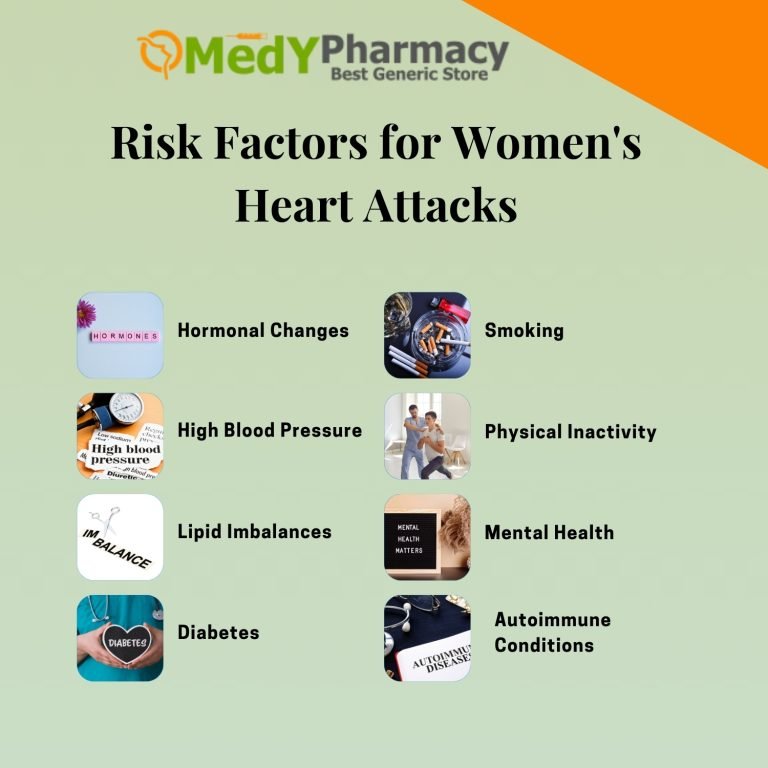
- Hormonal Changes
It is believed that women’s estrogen levels decline after menopause, raising their risk of heart disease. Women who experience a decrease in estrogen may be more susceptible to heart disease because estrogen protects the heart by preserving healthy blood vessels.
Additionally, preterm delivery may be linked to an increased risk of heart disease later in life. The risk of heart disease during delivery may be elevated by preeclampsia.
- High Blood Pressure
Women are frequently underdiagnosed with high blood pressure, particularly in its early stages, despite it being one of the main risk factors for heart disease. Heart disease and stroke are more likely to occur in women with high blood pressure. Preeclampsia and other pregnancy-related hypertension can raise the risk of long-term heart disease.
- Lipid Imbalances
During menopause, women’s cholesterol levels may fluctuate. A higher risk of heart disease is associated with lower levels of “good” HDL cholesterol and higher levels of “bad” LDL cholesterol after menopause.
A further worry is elevated triglyceride levels. Compared to males, women often have greater triglyceride levels, which can raise their risk of heart disease and heart attacks.
- Diabetes
Compared to males with the same symptoms, women with diabetes or pre-diabetes are at a far greater risk of developing heart disease. Diabetes increases the risk of atherosclerosis and heart attacks by damaging blood arteries.
As previously stated, type 2 diabetes is a significant risk factor for heart disease and women who have gestational diabetes during pregnancy are more likely to develop it later in life.
- Smoking
Although smoking is a significant risk factor for heart disease in both men and women, women may be more at risk for cardiovascular disease than males. The risk of heart attacks is increased by smoking because it speeds up the artery-clogging process of plaque. In addition, women who smoke are more likely to get high blood pressure and stroke.
- Physical Inactivity
The risk of various heart disease risk factors, such as high blood pressure, high cholesterol, and diabetes, is increased by being overweight or obese. Visceral fat, or extra weight around the stomach, increases a woman’s risk of heart disease.
In addition to making other risk factors worse, inactivity causes weight gain. Frequent exercise lowers blood pressure, cholesterol, and weight, all of which contribute to better heart health.
- Mental Health
Anxiety, despair, and chronic stress can raise a woman’s risk of heart disease. Stress can cause harmful habits like smoking, drinking alcohol, or overeating. It can also raise blood pressure and inflammation, both of which are factors in heart disease.
Depression is more common in women than in males, and it has been connected to a higher risk of heart disease. This is less likely to be well treated in women who suffer from depression.
- Autoimmune Conditions
Autoimmune conditions such as multiple sclerosis, lupus, and rheumatoid arthritis are more common in women than in males and can raise the risk of heart disease. Blood vessel damage and an increased risk of a heart attack can result from inflammation brought on by these disorders.
Are Hormones A Factor In Heart Attack Risk?
Many women take prescription hormone medications for birth control or to lessen menopausal symptoms.
Taking birth control tablets might raise your blood pressure and increase your risk of a blood clot in your legs or heart. You may thus be better off using other forms of contraception if you have a history of high blood pressure or clotting issues. However, the majority of young women may safely use birth control pills.
You could benefit from hormone replacement treatment if you have a very low risk of heart attack overall and you are in dire need of relief from hot flashes and other postmenopausal symptoms. We aim to avoid using them at all after the age of 65, though, as they do raise the risk of heart disease and maybe breast cancer.
Estrogen in particular is a hormone that is important for cardiovascular health. Although estrogen helps protect the heart in women, especially before menopause, the natural decrease in estrogen after menopause raises the risk of heart disease. Hormonal imbalances caused by pregnancy problems, PCOS, thyroid diseases, and other ailments can significantly impact heart function.
Hormonal variables, lifestyle modifications, and the control of other risk factors such as blood pressure, cholesterol, and diabetes are all part of controlling the risk of heart disease in women. To create a strategy to reduce risks, it’s critical to talk to a healthcare professional about your heart health if you’re going through menopause or other hormonal changes.
Do Heart Attacks Have An Average Age Range?
This can happen at any age, although it seems to happen more often in certain age groups. In general, the risk of having a heart attack rises with age; however, the typical age differs for men and women and is also impacted by lifestyle, genetics, and underlying medical disorders.
On average, heart attacks strike women later than they do males. This typically occurs in women between the ages of 60 and 70, frequently following menopause. Women are less likely to develop cardiac disease before menopause because of the preventive effects of estrogen, but this benefit diminishes as estrogen levels fall.
They can happen sooner, especially for people with major risk factors including obesity, smoking, a sedentary lifestyle, or uncontrolled high blood pressure or cholesterol. These are more frequent in the elderly age. These are less prevalent in younger individuals, but they can happen to some, especially those in their 30s or 40s. In certain situations, risk factors including drug use, genetics, or specific chronic illnesses could be more significant.
Might Heart Attacks Occur In Younger People?
- Hypertension
- Diabetes
- Chronic Kidney Disease
- Stroke
According to the researchers, young women are also more likely to have health insurance, which may increase their likelihood of seeking medical care and raise hospitalization rates.
Younger people are undoubtedly in danger, particularly if they have specific risk factors or underlying diseases, although these are more frequent in older folks. The risk of heart attacks can be significantly decreased, even in younger individuals, by controlling any pre-existing medical issues and adopting a heart-healthy lifestyle.
It’s crucial to remember that symptoms in younger people may not always be as evident as in older ones. For instance, typical chest discomfort may not always be experienced by younger individuals, and the symptoms may be mild or confused with less serious conditions.
Causes of Heart Attack in Young Men
Even while older persons are more likely to develop heart disease, younger men might still be in danger, particularly if they have specific risk factors or have unhealthy habits.
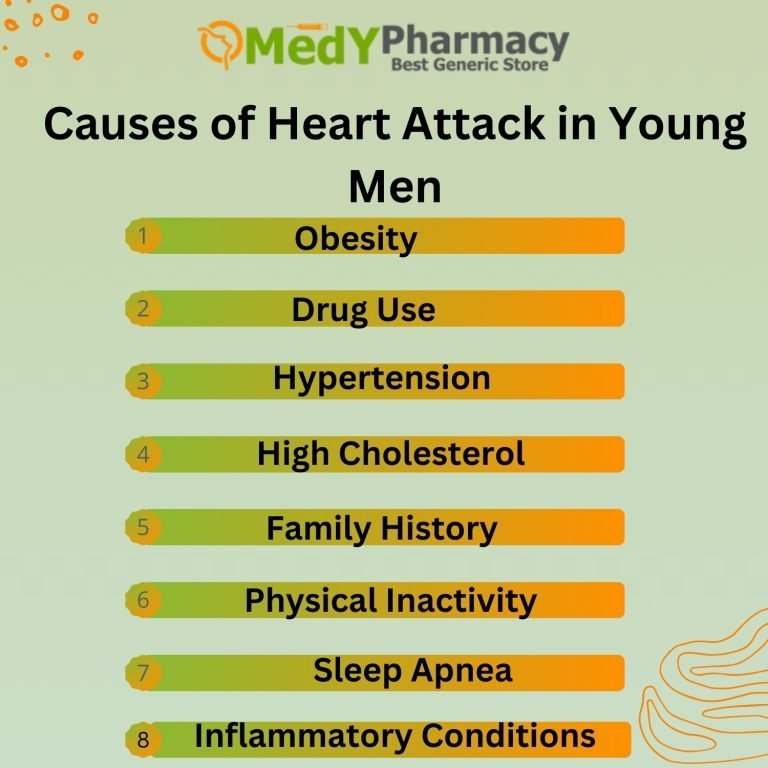
- Obesity
The risk of heart disease is increased by obesity at any age, but it is significantly higher for younger people, particularly those who acquire obesity early in life. The longer a person has been obese, the longer these risk factors can harm their heart and blood arteries.
One of the most important risk factors for heart disease and heart attacks that may be changed is obesity. Over time, it damages the heart and blood arteries by contributing to high blood pressure, high cholesterol, diabetes, and other conditions. In addition to improving general cardiovascular health, losing weight with a balanced diet and consistent exercise can dramatically lower the risk of heart attack.
- Drug Use
Heart attacks and other cardiovascular problems are significantly increased by drug usage, especially the use of some illegal drugs. Depending on the medication, the frequency of usage, and the user’s general health, the effects of drugs on cardiac health can be either short-term or long-term.
Although marijuana doesn’t directly affect the heart as much as stimulants like cocaine or methamphetamine, it can nevertheless raise blood pressure and heart rate. Cannabis usage, especially in the hours after use, may raise the risk of a heart attack in persons who already have cardiac problems.
Drug usage can greatly raise the risk of heart attacks, particularly when it comes to stimulants like cocaine, methamphetamine, MDMA, and prescription medications. Even drugs that are occasionally viewed as less hazardous, like alcohol and marijuana, can raise cardiovascular risks, especially in those who already have heart problems.
- Hypertension
Heart attacks and other cardiovascular issues can result from untreated hypertension, a dangerous illness. Regular monitoring and early identification are crucial since it frequently manifests without any obvious symptoms. This risk can be considerably decreased and cardiovascular health can be improved by leading a healthy lifestyle and, if required, using blood pressure medication.
A diet high in whole grains, fruits, vegetables, and low-fat dairy products can help control blood pressure. Regular aerobic exercise can help strengthen the heart and decrease blood pressure. Examples of this type of exercise include walking, running, swimming, and cycling.
- High Cholesterol
High cholesterol, particularly when LDL and HDL cholesterol levels are low, is a significant risk factor for heart disease and heart attacks. It is possible to considerably lower the risk of cardiovascular events by controlling cholesterol with a nutritious diet, frequent exercise, weight control, and, if necessary, medication.
Regular check-ups with your healthcare provider are crucial if you’re worried about your heart health or cholesterol levels. This will help you monitor and manage your cardiovascular health in general.
People who have not responded to previous therapies or who have familial hypercholesterolemia are usually treated with this more recent class of drugs that help decrease LDL cholesterol levels.
- Family History
Heart issues, including heart attacks, are far more likely to occur in those with a family history of heart disease. However, you may take proactive measures to control your health if you are aware of your family’s history of heart disease. Even if genetics is not on your side, working closely with a healthcare practitioner, leading a healthy lifestyle, and getting regular tests can help you lower your risk.
Persistent stress can harm your heart by raising blood pressure and encouraging bad habits like smoking and overeating. Put stress-reduction strategies like yoga, deep breathing, and meditation into practice.
The risk of heart disease can be decreased by maintaining a healthy weight, which can also help control blood pressure and cholesterol levels. It may make a big impact to lose even a little weight.
- Physical Inactivity
Inactivity is a major risk factor for heart attacks and other heart-related conditions. Insufficient physical activity or exercise can have a variety of negative impacts on cardiovascular health and general well-being.
Inactivity is a major risk factor for heart attacks and heart disease. It’s never too late to start becoming more active, which is wonderful news. Modest adjustments to your level of activity can have a significant effect on the health of your heart.
Start with easy exercises like yoga or swimming, stretching, or quick walks. Begin with a minimum of 10 minutes of physical exercise and increase it gradually. Whether you enjoy dancing, riding, hiking, or swimming, find what makes you happy and keep going.
- Sleep Apnea
When a person has sleep apnea, their breathing repeatedly stops and resumes while they are asleep. The health of the heart may be seriously impacted by these breathing disruptions, raising the risk of heart disease, excessive blood pressure, and even heart attacks. It’s critical to comprehend how sleep apnea affects heart health to avoid and treat any cardiovascular problems.
An elevated risk of heart attacks, high blood pressure, heart disease, and atrial fibrillation are all consequences of sleep apnea, which is more than simply a sleep condition. To enhance your quality of sleep and lower your risk of cardiovascular problems, it’s critical to get diagnosed and treated if you think you may have sleep apnea.
People with heart problems, in particular, should schedule routine follow-up sessions with their physician to assess their cardiovascular health and sleep apnea. To lessen sleep apnea’s negative effects on the heart, it must be consistently managed.
- Inflammatory Conditions
A collection of illnesses known as inflammatory ailments occurs when the body’s immune system responds erratically, leading to inflammation that can impact different organs, tissues, and systems. Heart disease, autoimmune illnesses, and other chronic ailments are among the many major health issues that are frequently associated with chronic inflammation.
Although inflammation is a normal bodily defense mechanism, when it persists or is not managed, it can lead to several health concerns, such as an increased risk of heart attacks and other cardiovascular disorders.
The risk of heart disease can be considerably raised by inflammatory illnesses, including autoimmune disorders, chronic inflammatory diseases, and other sources of systemic inflammation. It is essential to manage these disorders with medicine, lifestyle modifications, and routine monitoring to prevent heart attacks, strokes, and other cardiovascular problems. Working closely with your healthcare professional is crucial if you have an inflammatory illness to control inflammation and safeguard your heart.
Does A Person’s Chance Of Having A Heart Attack Grow With Age?
As people age, their chance of having a heart attack usually rises. The many physical alterations to the heart and circulatory system as a whole are the cause of this.
- An accumulation of fatty deposits: The walls of the arteries may accumulate fat. This will cause the coronary arteries, which provide the heart with oxygen and blood, to constrict. We term this disease atherosclerosis.
- Arterial hardening: The arteries get tougher as people age. The chance of suffering a heart attack may rise if the arteries are not as flexible as they should be.
- Heart wall thickening: The heart’s walls may get thicker, which makes the heart bigger. The heart is bigger, yet the amount of blood decreases.
- Heart valve weakness: The heart has four valves that keep blood from flowing incorrectly. The heart finds it more difficult to regulate blood flow as people age because these valves may weaken or grow stiffer.
- Heightened sensitivity to sodium: While some persons may see an increase in sodium sensitivity, others may not. A person’s chance of having a heart attack may rise if their salt sensitivity increases, according to the NIA.
Tips for Preventing Heart Attacks
A mix of good practices, lifestyle modifications, and routine checkups with the doctor are necessary to prevent heart attacks. With deliberate effort, several heart disease risk factors, including obesity, high blood pressure, and high cholesterol, may be reduced or managed.
Quitting smoking has immediate advantages, and within a year, your risk of heart disease is almost half that of a smoker. Discuss the resources that are available with your healthcare professional if you require assistance stopping.
If you are at risk, have your blood pressure tested more regularly, although at least once a year is a good idea. Work with your doctor to reduce it if it’s high by changing your lifestyle or taking medicine.
The risk of heart attacks and other cardiovascular conditions can be considerably decreased by implementing these heart-healthy behaviors. Focusing on prevention, leading a healthy lifestyle, and attending routine check-ups are all crucial. Consult your physician for a customized preventative strategy if you have heart disease risk factors.
Find out what causes heart disease and how to protect your heart. Continue to take charge of your health by implementing minor adjustments to your daily schedule that, over time, will have a significant effect on your heart health. Feeling lightheaded or dizzy for no apparent reason, especially when accompanied by chest pain.
Can A Heart Attack Occur In A Healthy Person?
An increased chance of a heart attack might result from a family history of heart disease, even if the individual has no lifestyle risk factors. The risk can also be increased by inherited diseases, such as familial hypercholesterolemia, even if an individual has generally good behaviors.
In contrast to the majority of heart attacks, which are brought on by the rupture of an atherosclerotic plaque, this kind of heart attack occurs when a healthy artery suddenly narrows or spasms.
Extreme emotional stress in this situation might cause abrupt, transient cardiac malfunction. Although it doesn’t usually cause a heart attack, it might resemble its symptoms, such as shortness of breath and chest discomfort. In certain instances, it may even result in cardiac failure.
A cardiac artery’s inner lining may occasionally tear. A blockage that limits blood flow to the heart may result from blood pooling between the arterial wall’s layers. Although it can happen to otherwise healthy people, younger women—especially those who have just given birth—are more likely to experience this.
Even while heart attacks in seemingly healthy people are less prevalent, they can still happen for a variety of reasons, including heredity, undetected diseases, or unexpected occurrences. Even if a person doesn’t exhibit any overt symptoms, they should be proactive in controlling any potential risk factors, be aware of their general heart health, and receive frequent checkups because heart attacks can happen at any time.
Without a doubt, given the severe repercussions that can occur at such a young age, we must take good care of our nutrition, lifestyle, and health to prevent a life-threatening event like a heart attack.
Starting to pay attention to our health is crucial. Moreover, utilize Medypharmacy‘ Super Vidalista if you wish to get medications to restore your sexual functions.







